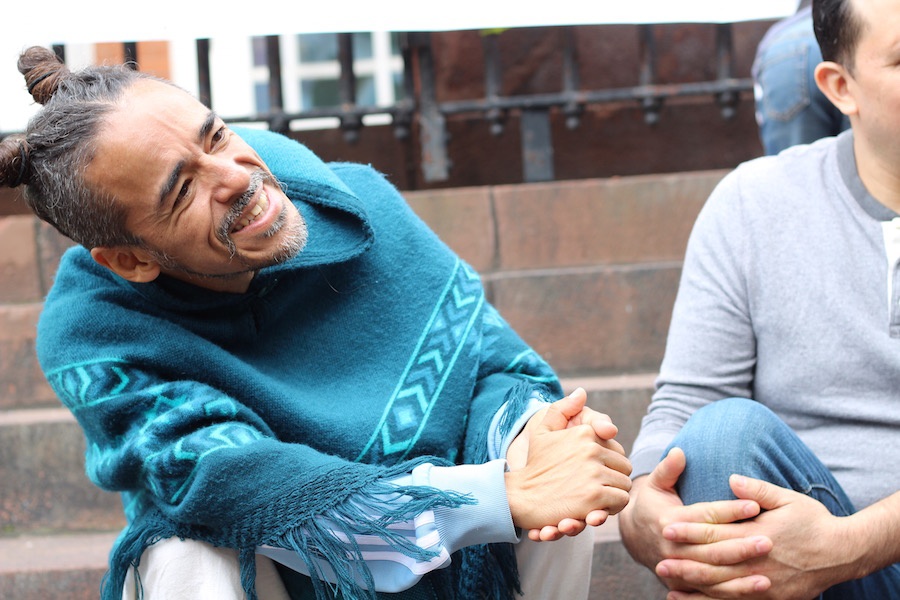
College Street Music Hall | Music | Arts & Culture | New Haven
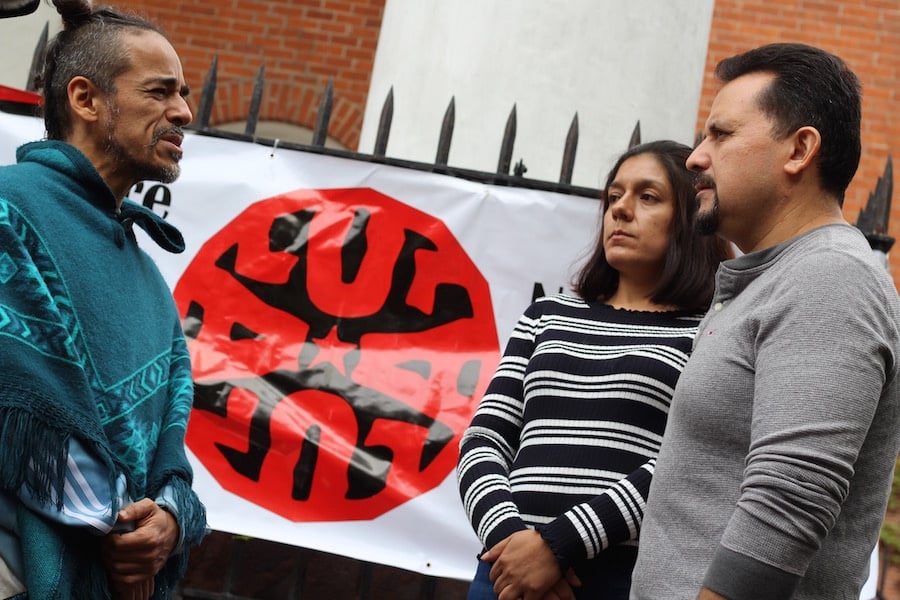
| Lucy Gellman Photos. |
At first, it wasn’t clear exactly what Rubén Albarrán was saying. The lights changed from pink to deep blue and back to pink again, focusing their beams on the band. Albarrán’s voice, strong and nasal, flowed through the hall. Members of Café Tacvba stood at attention at their instruments. Hundreds of hands waved through the air. The sound un-jumbled itself in the mic’s cables: “Free! Nelson! Pinos!”
Sunday afternoon and evening, Albarrán—who fronts the award-winning Mexican rock band Café Tacvba—delivered that boundary-shattering message several times across New Haven, working his way through the city’s downtown before a playing packed show at College Street Music Hall. The city was a stop on the band’s Niu Güeis Tour, sandwiched between Philadelphia and Toronto.
Albarrán began his mini-tour of New Haven at First & Summerfield United Methodist Church on Elm Street, where immigrant Nelson Pinos has been seeking sanctuary from Immigrations and Customs Enforcement (ICE) for 297 days, or almost 10 months. Making a beeline for the church’s steps, Albarrán stood across from Pinos, taking in the scene. Pinos’ wife, two of his three children, and a small group of activists from Unidad Latina en Acción (ULA) gathered around them.

Albarrán greeted the group, working through pleasantries—Buenos días. ¿qué tal?—before focusing on Pinos, asking him questions about his time at First & Summerfield, and the conditions that led to his stay in sanctuary. He nodded at each answer, a turquoise serape swaying just slightly as he clasped his hands, and took in each word.
How long had Pinos been in the church, Albarrán asked? Almost 10 months. How long had he lived in the United States? Twenty-six years. How many children did he have? Three, two of whom were present. What kept him there? He had been deemed a criminal for crossing a border, and now ICE wanted to deport him to his native Ecuador. The two sat, Albarrán turning to other members of the group and asking what had brought them out.
“And you, are you students?” he asked. A few replied: yes, and studying in Connecticut, but from Colombia, Guatemala, Mexico. He grinned at a little boy who piped up from the back, proudly announcing his and his dad’s native Oaxaca. ULA founder John Lugo motioned to the group, and to a banner for the organization that hung behind them.
“We are for immigrants, by immigrants,” he said. He explained sanctuary policy: that ICE officials aren’t supposed to go into hospitals, schools, public gatherings or houses of worship. That Pinos has remained in one place since his deportation order last November, because he may not be safe if he leaves the church.
“Do you want to see where he lives?” Lugo asked in Spanish. Albarrán nodded, following Pinos down a narrow stone alleyway beside the church and back into the building. The two passed through a doorway, a small line of activists behind them.
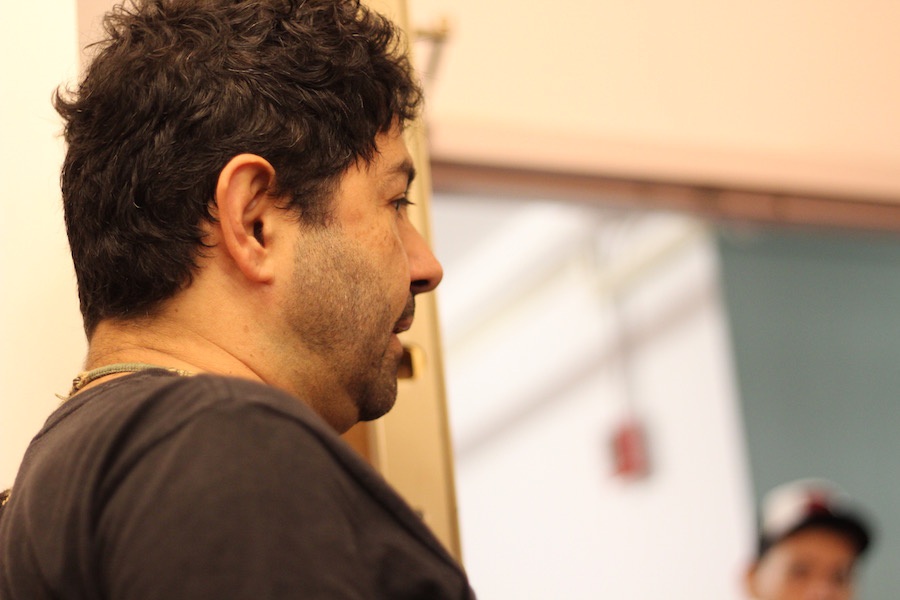
| "We defend our right to migrate based on our indigeneity," said ULA founder John Lugo Sunday. He added that "we will celebrate our indigeneity and our right to pass through the continent just as our ancestors did for thousands of years" of members of ULA on Oct. 13 of this year. |
Pinos motioned up a set of stairs, the red carpet worn beneath them. At the top, a small bedroom stood open at the right. Inside, Pinos explained, was part of the story of his last nine months and change: a low bed with a blue-and-white checkered quilt, oval mirror with a list of emergency phone numbers taped to it, a custard-yellow couch and wood table. One of his son’s Brandon's drawings, finished in bright crayon, added a pop of color by the mirror.
Lugo described the work that ULA has done for 16 years, discussing the birth of the Elm City ID Card, mobilization against police misconduct and ICE, and the organization’s reach across the state. He called mobilizing incredibly important for New Haveners, describing the importance of securing official city documentation for immigrants who live in the community, and may be afraid of law enforcement.
“Many congratulations on your work,” Albarrán said in Spanish. He asked if there were other organizations like ULA in Connecticut and the U.S., listening as Lugo spoke about the history of activism in Chicago, New York City, and Los Angeles. The conversation shifted to Mexico, where Albarrán hails from, and has angered and agitated government officials with his music more than once. Lugo asked if Albarrán thought Mexico's new government would help with immigration policies, referring to the election of Andrés Manuel López Obrador in Mexico last month.
"Many people hope that we could build a transnational movement," Lugo said. "And hope that the new administration [in Mexico] may help give visibility to all of the people [migrants] who are suffering when they cross through Mexico."
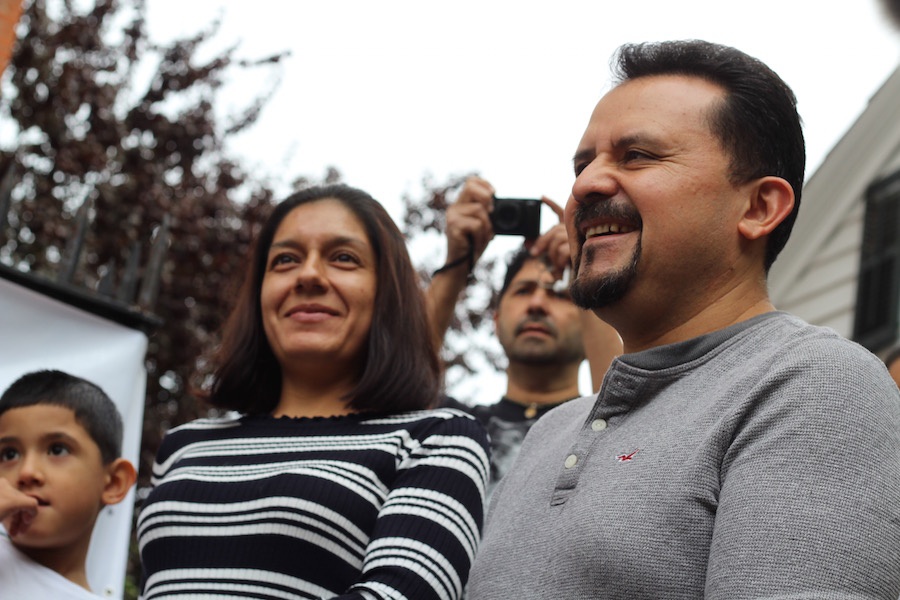
"I think that we are undergoing a transformation like everyone in Mexico," Albarrán responded in Spanish. "And this is an important opportunity for Mexicans, for civil society, to start taking action, because I don’t think that just one person has the power to change things."
"In this case, the president elect, I don’t think has the power," he continued. "We hope, we want to believe, that he has good intentions, but we also cannot be certain of that. And at the end of the day, democracy is not about that [one leader changing things]. Democracy is about participating, being active, watchful, and vigilant of the people who were elected supposedly by the power of the people."
But his philosophy stretches decades back, to an entry into music influenced by indigenous Mexican culture, Afro-Mexican melodies, the diasporic histories of jazz and blues, Brazilian, Columbian, and Peruvian music, and classic American rock bands including the Pixies, Smiths, and Violent Femmes. With fellow band members of Cafe Tacvba— Emmanuel Del Real on vocals, keyboards, and guitar, Joselo Rangel Arroyo on guitar, and his brother Enrique Rangel Arroyo on bass—it’s a musical career that has rendered borders obsolete, reaching across them for material that is uniquely, but not solely, Mexican rock and fusion.
In a panel discussion hosted by the Yale Center for the Study of Race, Indigeneity, and Transnational Migration Sunday afternoon, Albarrán spoke about his approach to political music, a career that has become as spiritual as it is wide-reaching and mellifluous. Close to 60 attended the event, held in Spanish with translation services at Yale University's Harkness Hall.
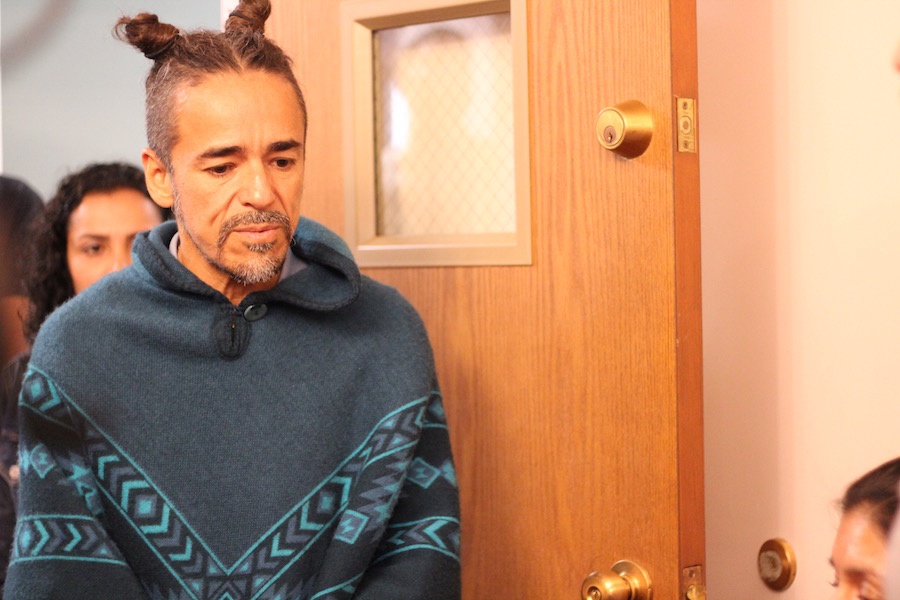
“We’re all a mixture,” Albarrán said of both his heritage and music, speaking to local legal advocate and WPKN host Luis Luna (read about all of the panelists here). “We believe that we’re all mixed—that that Mestizo is universal.”
Cafe Tacvba began in 1989, when the group’s current members were students and friends of students at the Metropolitan Autonomous University in Mexico. Even the band’s name, Albarrán said, is meant to transcend borders: “Café” comes from the imported coffee bean, and its humble origins in the Arab world. “Tacvba” or Tacuba is a reference to Tacuba or Tlacopan, Mexico—land that once belonged to the Aztecs, and is still spoken as an indigenous dialect.
From the beginning, band members drew on influences they heard around the city and in their homes. For Albarrán, that included a a representative of Aztec music who would come on the radio when he was just a kid, listening to whatever his parents listened to. He queued up a piece for the audience, describing it as “a combination of cultures, that also tells a story of migration.”
Now, he said, he sees that music as part of the band’s responsibility to break down borders. When asked by Luna whether he saw speaking about immigration as his artistic responsibility, Albarrán gave a quick shake of his head. It’s not his responsibility as a musician, he responded, but as a human.
“We have to open our eyes and see what other people are going through,” he said. “True change is something that goes way beyond borders. It goes way beyond our nationalist tendencies. We really are screwing things over by believing we are all different nations.”
For him, he added, practicing that philosophy has taken an intersectional approach—he is not just a political musician, but also an animal rights activist, feminist, advocate of water and land sovereignty, and vocal opponent of borders. He now considers himself part of the feminist movement, so much so that Cafe Tacvba stopped playing its song “La Ingrata” (“The Ungrateful Woman”) a year ago, because it advocates violence against women.
Sunday, he invoked the teachings of the Zapatistas, noting the group’s revolutionary roots during his grandparents’ lifetimes. He suggested music as a path to community building, for its ability to provide a window into other cultures through which listeners can walk. He urged audience members to dig into their communities, learning from the earth and their elders (“you can call me a hippie, but I call it Mother Earth”) instead of in their classrooms. And to use that knowledge—their connection to the world and the people around them—to render borders obsolete.
“We were born as immigrants,” he said. “We were born walking. Our nature is to walk, to migrate … other worlds are possible.”
“I don’t think about Mexico anymore,” he added in response to a question from the audience on where he sees Mexico in 20 years, joking that he would be playing "Futuro" off the group's latest album that night, if the audience wanted a more thorough answer. “I want us to erase these borders. Having borders is a way of pitting us against each other. ”
He brought that message to College Street Music Hall just two hours later, playing to a crowd of over 600 that packed the space. Traversing works from the band’s recent album Jei Beibei back to Cafe Tacvuba and Re, Albarrán and band members Emmanuel Del Real, Joselo Rangel Arroyo and Enrique Rangel Arroyo played off each other, three dancing from their instruments as Albarrán criss-crossed the stage hundreds of times, standing on its precarious edge more than once. Gone was the turquoise serape from earlier, replaced by a tight black button down that was soaked in sweat.
The quiet, paced Albarrán of hours earlier was gone. At one point, he became totally airborne, jumping so quickly and so high it seemed he had and invisible pogo stick. In another, he clapped his hands quickly over his head, the audience instantly following along. Band members came to the front of the stage, doing a slow, silly rock n’ roll Macarena under bright stage lights. The crowd roared as the band pulled old pieces back onto the stage, hundreds singing along and calling for old songs that they had grown up with, and were now playing for kids at home. Between numbers, Albarrán joked with the audience, admonishing members of the crowd who called for different songs.
“I want you to join me in this compassion and universal love chants,” he said as the band eased back into its set, a performance that ended in four encores, and mingling with audience members who had stuck around. “Are you ready?”
Our massive thanks to ULA member Megan Fountain for help with Spanish translation. Read more on the concert from Brian Slattery at the New Haven Independent.

